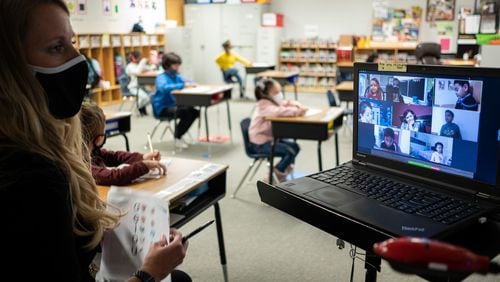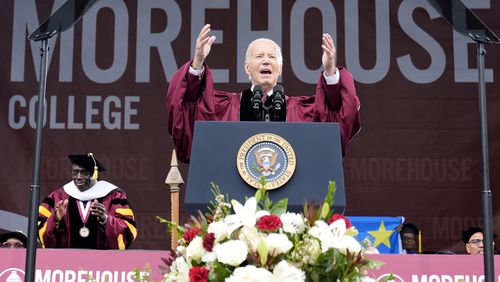The number of children signing up for Georgia kindergarten classes plummeted this school year, a trend education officials say is a likely reaction to schooling during a pandemic and which has potential consequences for funding next year.
Enrollment also dropped in first through fifth grades but not by as much, according to new enrollment data published by the Georgia Department of Education.
At the same time, the number of students in high school increased.
There are likely multiple colliding trends that are driving the unusual and conflicting numbers, from a baby bust during the Great Recession to the difficulty younger students have attending class online, a common mode for school during the COVID-19 pandemic.
Also, kindergarten attendance is discretionary; school in Georgia is not compulsory until first grade.
“A good guess is a lot of these parents chose not to go ahead and put their children into the program,” said Steve Flynt, who does the enrollment projections and planning for Gwinnett County Schools. The state’s largest school district more or less mirrored the enrollment dips and rises at each grade level statewide.
It’s been a topic among superintendents, and not just in Georgia, said John Zauner, executive director of the Georgia School Superintendents Association. During a national conference with peers across the country last week, he said, they were all seeing a similar trend.
During Georgia’s 10-day counting period in late September and early October, 114,444 children attended a public kindergarten. That is down 11,906 students from the same period in 2019, a decline of nearly 10%. Across all grades, there were more than 33,000 fewer students enrolling this fall, with most of the other declines at the elementary school level, where fifth grade saw the largest reduction. Enrollment in all grades combined was down about 2%.
According to the Southern Regional Education Board, a research and consulting organization for Georgia and 15 other states, Mississippi, Kentucky and Virginia are among nearby states that also have had enrollment declines. Virginia recorded a drop of about 38,000 students, with about 12,000 of the children from families that deferred kindergarten for a year, the organization said, adding that the challenge of taking attendance online may be contributing to the lower counts.
In Georgia, where roughly half of school budgets come from the state, with the money allocated based on full-time enrollment counts, there could be serious consequences next school year and the one after.
“The question among superintendents is, ‘OK, when are these kids coming back?’ And I’m telling them don’t bank on it," Zauner said. "From a financial standpoint, there’s a lot of money lost here.”
No one knows exactly how much because the subsidy is based on three enrollment counts — two during two consecutive fall semesters, and one during the intervening spring.
Rusk Roam, the finance chief at the Georgia Department of Education, estimates that the loss could be in the $100 million range though. Tiffany Taylor, a deputy superintendent there and liaison to the Georgia General Assembly, said the agency is planning to ask lawmakers next year for a one-time subsidy to make up the expected losses.
So why did enrollment fall in some grades but rise in others?
Parents of kindergarten-aged children in school districts that are exclusively online may have placed them in daycare instead or may have chosen to homeschool them. State figures in October showed a roughly 20% increase in homeschool declarations. Screen time is a worry, particularly with younger students. “Some families have expressed concerns that their children will have a hard time paying attention to virtual instruction for long periods of time,” Joyce Bradley, the early learning coordinator for Clayton County Public Schools said by email.
But older students face more complicated material that many parents may have felt they couldn’t handle, especially with grade point averages and college on the line. That could help explain the enrollment increases in most high school grades.
Also, births in Georgia plummeted in the six years after the peak in 2007, dropping 13% to around 130,000 by 2013, changing little thereafter. Older high school students now were born before that bust, which coincided with the Great Recession.
Kenneth Zeff, a former Fulton County superintendent turned school advocate, said more families with teenage children may also be pulling them from a private school and enrolling them in a public one. That tends to happen during hard economic times, said Zeff, executive director of Learn4Life, which works with metro Atlanta school districts. And graduation rates at public schools are rising, which means fewer are dropping out of high school, he said, suppressing the attrition that can happen in the later grades.
Not all school districts followed the state trend, and the numbers varied from district to district. In southeast Georgia, Bacon County enrollment was down but it was up in Baker County. And in the north Atlanta suburbs, Cherokee County’s dropped while Forsyth County’s rose. Tim Amerson, the facilities planning director for Forsyth County Schools, said the area has plenty of land under development after the recession paused projects which will eventually mean even more students for Forsyth schools. He said there is a property with 300 residential lots behind his own home.
“All these lots are still vacant but they’re buying them up and building on them,” he said.
About the Author







